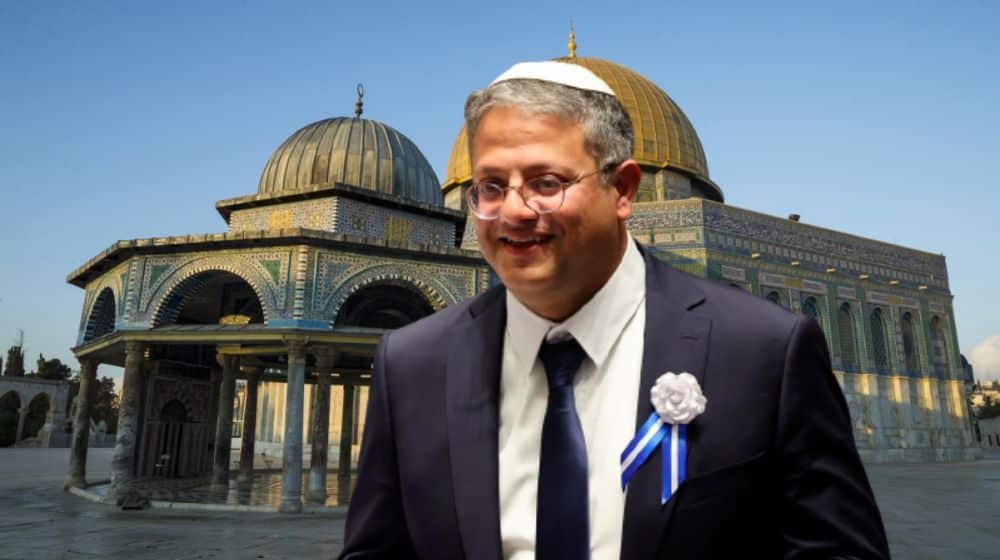Itamar Ben-Gvir visited the flashpoint site for the first time since taking office as Israel’s national security minister. The move was seen as a “provocation” by Palestinians, as well as Israeli opposition.
Israel’s new national security minister, Itamar Ben-Gvir, on Tuesday visited a Jerusalem flashpoint holy site known to Jews as the Temple Mount and to Muslims as the Noble Sanctuary.
“The Temple Mount is open to all,” the ultranationalist politician said afterward on Twitter.
ממשלת ישראל שאני חבר בה לא תיכנע לארגון מרצחים שפל. הר הבית פתוח לכולם ואם החמאס חושב שאם הוא יאיים עליי זה ירתיע אותי, שיבינו שהשתנו הזמנים. יש ממשלה בירושלים! pic.twitter.com/vgDYBYacJG
— איתמר בן גביר (@itamarbengvir) January 3, 2023
Israeli media published photos of Ben-Gvir touring the site accompanied by heavy security. According to the AFP news agency, a drone monitored his visit from overhead.
Prime Minister Benjamin Netanyahu’s Arabic-language spokesperson, Ofir Gendelman, later posted video footage on Twitter showing that the “situation is completely calm” at the holy site following Ben-Gvir’s departure.
The Temple Mount in Jerusalem is revered as a holy site in Judaism, Christianity, and Islam.
The Western Wall of the Temple Mount, known more commonly in English as the Wailing Wall, is the most sacred site in Judaism. It is accessed from outside the complex. According to Jewish scripture and tradition, the Temple Mount is also the site of two ancient temples.
For Muslims, the site is known as “al-Haram al-Sharif” and is home to the Dome of the Rock and the Al-Aqsa Mosque — the third-holiest site in Islam.
Why Did Ben-Gvir Visit the Temple Mount?
Ben-Gvir has visited the compound on multiple occasions, but his visit on Tuesday comes days after he was sworn in as Israel’s Minister for National Security.
This makes him the highest-profile Israeli official to visit since then-opposition Ariel Sharon did so in 2000. Palestinian groups responded to Sharon’s visit at the time with protests that led to the Second Intifada.
In recent years, Ben-Gvir has campaigned to allow Jewish worshipers to pray inside the Temple Mount, a move opposed by mainstream rabbinical authorities.
“The Temple Mount is the most important place for the people of Israel, and we maintain the freedom of movement for Muslims and Christians, but Jews will also go up to the mount, and those who make threats must be dealt with — with an iron hand,” Ben-Gvir said in a statement published by his spokesperson on Tuesday.
Israeli forces are responsible for the security, but the contested site is administered by Jordan. Jewish worshipers’ access to the Temple Mount is heavily restricted.
Why is The Visit Seen as Controversial?
Ben-Gvir previously stated his intent to visit the site. This drew threats from the Palestinian Islamist group Hamas. The group runs Gaza and is recognized as a terrorist organization by the German government, the EU, the US, and some Arab states.
Basem Naim, a senior member of the Hamas militant group, said last week that such a step would be “a big red line and it will lead to an explosion.”
The visit was also controversial among Israeli politicians.
“Itamar Ben-Gvir must not go up to Temple Mount,” opposition leader and former Prime Minister Yair Lapid were quoted as saying by the Times of Israel newspaper on Monday. “It is a deliberate provocation that will put lives in danger and cost lives.”
The paper reported earlier that Ben-Gvir had agreed to hold off on the visit after speaking with Netanyahu later that day.
However, on Tuesday, Ben-Gvir went ahead with the visit, saying that the Israeli government “will not surrender to the threats of Hamas.”
How Did Palestinian Leaders React?
The Palestinian Authority’s Foreign Ministry said it “strongly condemns the storming of Al-Aqsa Mosque by the extremist minister Ben-Gvir and views it as an unprecedented provocation and a dangerous escalation of the conflict.”
Ben-Gvir taking the sensitive role of the national security minister has raised fears of inflaming tensions with Palestinians and Israel’s Arab minority. He is a vocal supporter of the late Meir Kahane, a former ultranationalist lawmaker whose Kach political party was banned in Israel in 1994 under anti-terrorism laws.
As a lawyer and then a politician, Ben-Gvir rose from the far-right fringe of Israeli politics to make global headlines for his anti-Palestinian speeches and stunts.
On Monday, Palestinian official Hussein al-Sheikh called for “a Palestinian, Arab and international response” to Ben-Gvir’s visit.
Jordan, which acts as custodian of the contested shrine, condemned Ben-Gvir’s visit “in the strongest terms.”
Saudi Arabia, the United Arab Emirates, and Egypt also condemned what they described as the “storming” of the Al-Aqsa Mosque compound.


























